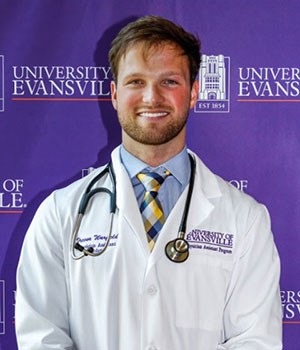Trevor Warfield
Physician Assistant

Hometown: Evansville, Indiana
Undergrad/Master's degree/ College attended: DePauw University (Biochemistry)
What made you want to be a PA?
I had the opportunity to work as a scribe in the Emergency Department at St. Vincent Hospital in Evansville, Indiana (formerly St. Mary’s Hospital) and was able to learn more about what a PA is, as well as what they do. The quality time I spent with some of the PAs that I worked with encouraged me to research more about the profession, and I ultimately decided that I wanted to pursue becoming a PA.
Why UEPA? Or what makes UEPA different than other PA Programs?
Although I was born in Lexington, KY, most of my life has been spent here in Evansville. Having family in the area certainly played a part in my decision to attend UEPA, but it was not the deciding factor. I had the chance to meet some of the UEPA faculty and staff before, during, as well as after the interview process and everyone was extremely welcoming, helpful, and encouraging. My interactions with the faculty and staff is what, in my mind, set UEPA apart from other PA programs.
What was your major in undergrad and did it prepare you for PA School?
My undergraduate major was Biochemistry at DePauw University. Being a Biochemistry major helped me prepare for PA school because the courses I was required to take coincided with many of the prerequisite courses that many PA schools list must be taken to apply.
How did you prepare yourself for the academic load of being a PA student?
I believe my undergraduate education helped prepare me for the academic load of being a PA student. On top of being a full-time student, I was involved in a technology program called Information Technology Associates Program (ITAP) at DePauw University and was also a member of the Men’s Swimming and Diving team. This amount of time-commitment required that I manage my time accordingly so that I could study effectively.
What is your favorite part of PA School?
Being surrounded by other individuals that have similar interests, are goal-driven, and are generally likeable people would have to be my favorite part of PA school. Don’t get me wrong, I really enjoy learning about each subject, but having people that are similar to you that you can go through the rigors of graduate school with makes it even more enjoyable.
What is your favorite class?
My favorite class right now would have to be Clinical Medicine, where we learn all about the different disease states and conditions we may come across. We do however have a Clinical Skills course, where we will be learning hands-on how to perform different procedures such as placing intubation tubes and performing spinal taps, and I think that may end up being my favorite course.
What is the best study skill you can recommend for a PA student?
Other than just making sure that you consistently stay on top of your studies, I don’t think there is one study skill that will work for everyone. My recommendation would be to keep an open mind and try different study habits to see what works best for you.
What is the best study skill you can recommend for a PA student?
Other than just making sure that you consistently stay on top of your studies, I don’t think there is one study skill that will work for everyone. My recommendation would be to keep an open mind and try different study habits to see what works best for you.
What is your best advice for anyone working on the CASPA application?
My best advice would be to get started on it as soon as you possibly can and try to get as much of it done as quickly as you can so that you have plenty of time to look over the application multiple times, as well as have time to have a parent/guardian or mentor look over the application to see if there has been any mistakes that need to be corrected.
What is your best advice for the interview process?
Just breathe. If you’ve gotten an invitation to interview, you’re among a select few individuals that even get that opportunity. Sure it’s nerve-racking, but this is your time to show everyone why you belong in the program and you should be excited about it. If you start to feel nervous or overwhelmed, just take a deep breath, collect yourself, and continue the interview.
Are students at UE competitive or collaborative?
My classmates are more collaborative than competitive. Many of us come from some sort of a competitive background, so if we want to be competitive we will find something outside of class to compete at, and save class for collaboration. I think we all realize that at the end of PA school we won’t be competing with other healthcare workers, we will likely be working and collaborating with them, so we might as well start now.
What is your typical day like?
A typical day for me would include: classes in the morning, a lunch break, some more classes (depending on the day), some break time, and then studying until dinner (and after dinner depending on the day). Depending on when class starts/finishes, I like to exercise either before or after class.
What specialty do you want to pursue? Why?
I’m definitely keeping my mind open and hoping that clinical rotations will help me decide what specialty I’d like to pursue, but since I worked as a scribe in the Emergency Department I think that could potentially be an area I’d like to pursue. I also have an interest in Orthopedics, Dermatology, and Plastic Surgery
